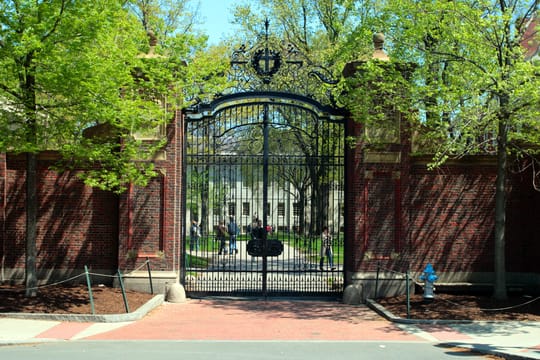Required DEI Statements

Diversity statements as a hiring requirement have served to undermine a central value of academia: open inquiry.
NEW REPORT: Analysis of DEI Statements in Faculty Job Ads from Fall 2024
Analyzing over 10,000 job ads from across the academy, we document the prevalence, distribution, and characteristics of DEI statement requirements in the in Fall 2024 faculty hiring cycle. 22.3% of 10,000+ faculty job advertisements from the 2024-2025 U.S. higher education hiring cycle requested DEI statements or other DEI-related materials; and only 15.6% of job ads requesting DEI statements mention viewpoint diversity concepts, suggesting that most requests for DEI statements focus on demographic diversity rather than intellectual or ideological diversity. Download to learn more.
At Heterodox Academy, we oppose the requirement of DEI statements in faculty hiring because they undermine the core academic principle of open inquiry, while filtering out viewpoint diversity.
DEI statements—often one- to two-page essays detailing a candidate's commitment to advancing diversity—have increasingly become key filters in faculty hiring. This requirement pressures applicants to align with specific ideological views, regardless of their personal beliefs, effectively functioning as compelled political speech.
While many support the ideals of inclusion and racial justice, there is no consensus on how these goals should be achieved. For example, the concept of equity—often defined as proportional representation by identity group—is a contested approach. Other legitimate perspectives, like the civil rights ideal emphasizing equal opportunity and individual merit, are frequently marginalized in this process. When universities adopt DEI statements as litmus tests, they risk excluding those who hold reasonable, alternative views.
Moreover, there is little evidence that requiring DEI statements has made faculty hiring more fair or improved student experiences. Given the competitive nature of academic hiring, candidates are incentivized to tell committees what they want to hear, rather than offering genuine reflections. This disadvantages applicants who may not excel at ideological signaling, including international, working-class, and neurodivergent scholars—many of whom have meaningfully contributed to supporting underrepresented students.
By pressuring candidates to conform to a singular narrative, DEI statements erode academic integrity—the foundation of honest scholarship. Integrity means saying what you believe and believing what you say. When scholars are forced to compromise this, the ideal of scholarship itself is compromised.
At Heterodox Academy, we stand against practices that constrain open dialogue. True diversity in academia includes diversity of thought, and maintaining academic freedom means creating space for honest, varied perspectives—without coercion or ideological litmus tests.
It’s time to turn the page on required DEI statements
John Tomasi writes in RealClear Education, “The diversity statement requirement exerts a corrupting force against young scholars entering the profession, and even against established scholars seeking to move to new universities. Integrity, saying what you believe and believing what you say, is central to the ideal of scholarship. By undermining the integrity of applicants, the diversity statement requirement erodes the ideal of scholarship itself.”
HxA members and Campus Community Co-Chairs at CU Boulder, Matthew Burgess (now at U. Wyoming) and Peter Newton wanted to improve practices in their own department. But instead of simply spotlighting the problems with current practices, they also proposed a new idea.
In early 2024, the faculty of the Department of Environmental Studies at CU Boulder voted unanimously that all future faculty job advertisements will no longer require diversity statements and will instead ask candidates to submit a service statement in addition to the usual research and teaching statements. Burgess and Newton explain that service statements are a progressive, legal, ethical, and constructive alternative to diversity statements for multiple reasons:
Service statements align with what’s expected of a successful faculty member.
Requiring service statements signals the value of service.
Service statements allow applicants to discuss DEI if they want to but do not require them to.
The policy change was narrowly defeated by faculty vote the first time it was proposed. But working collaboratively with a faculty group who initially opposed the policy change, a revised version was worked on together. At the second attempt, the policy proposal passed with little discussion. “We consider it a small but significant shift of the needle toward a more fair, ethical, legal, and liberal hiring process,” said Burgess and Newton.
Our staff and members have written about DEI statements and efforts to diversify the academy on our blog. A selection of articles are below.
The Past, Present, and Future of Diversity Statements in Academia.
Heterodox Academy's President, John Tomasi and esteemed guests Randall Kennedy of Harvard Law School and Brian Soucek of UC Davis Law School discuss the history of diversity statements in higher education, today's DEI landscape, and what it means for the future of faculty hiring.
DEI Criteria in Faculty Hiring are Incompatible with Academic Freedom
DEI statements are too often scored in explicitly ideological terms, with point-by-point assessments of candidates’ opinions, attitudes, and extracurricular activism. Such screening is appropriate for a political party, not an academic department. When DEI statements are used to filter out dissenters, the practice is incompatible with academic freedom.
- Filter by Format
- All Formats
- Resource
- Blog
- Report
- Event
- Announcement
- How One CU Boulder Department Ended DEI StatementsOctober 29, 2025+Viewpoint Diversity+Required DEI Statements
- When ‘Diverse Citations’ Replace Diverse IdeasOctober 20, 2025+Erin Shaw+STEM+Required DEI Statements
- New HxA Study of 10,000 Faculty Job Ads Shows DEI Statement PrevalenceAugust 13, 2025+Erin Shaw+Required DEI Statements+Viewpoint Diversity
- What Does “Non-Political” Mean? A Discussion of the Lawsuit against UBCMay 14, 2025+Institutional Neutrality+Required DEI Statements+Canada+Hybrid
- Ideological Insistence: Diversity Statements and the Challenge to Academic FreedomApril 25, 2025+Academic Freedom+Required DEI Statements+In-person only
- Can we achieve true intellectual diversity in academia without political litmus tests?April 19, 2025+Alice Dreger+Required DEI Statements
- The influential University of California system ends the use of DEI statements in faculty hiring.March 20, 2025+Nicole Barbaro Simovski+Required DEI Statements
- Is academic freedom the baby we’re throwing out with DEI political litmus tests?February 4, 2025+Nicole Barbaro Simovski+Academic Freedom+Required DEI Statements